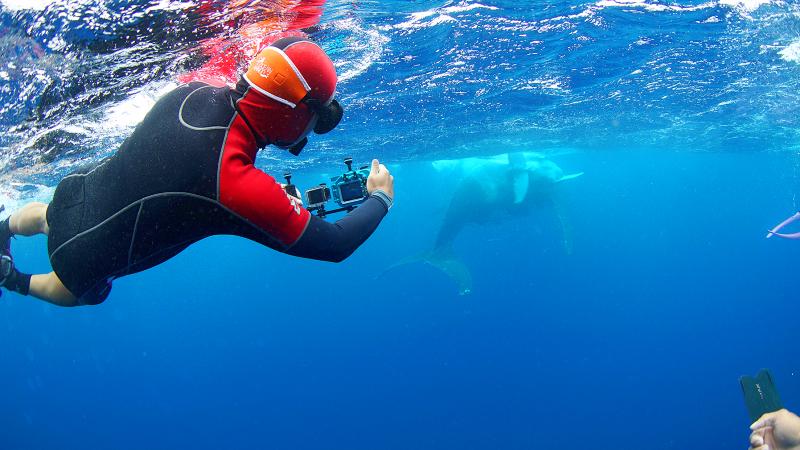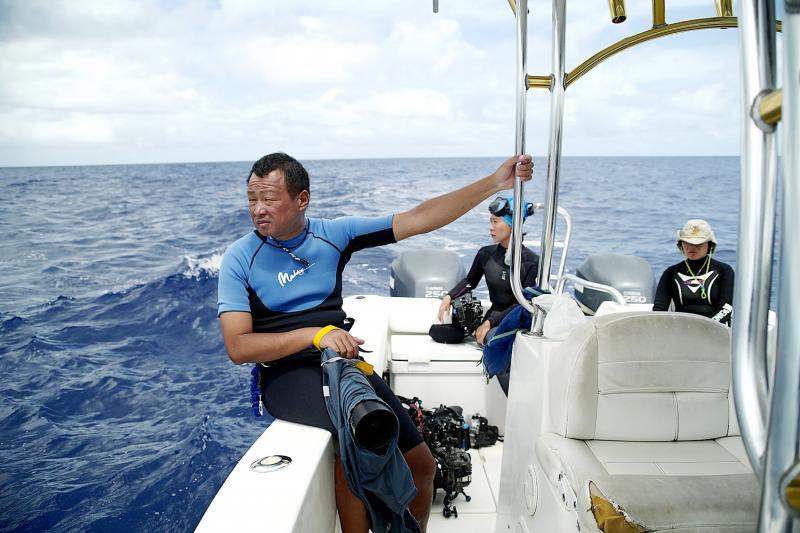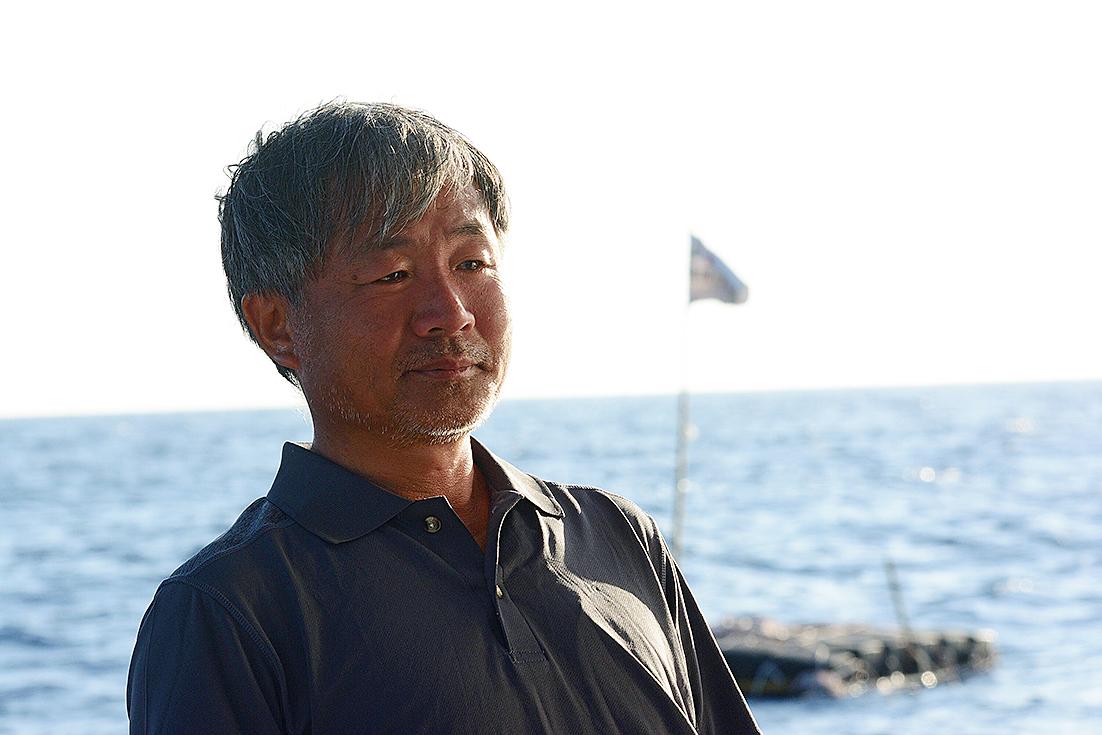Even though Taiwan is surrounded by the ocean, its people have turned their backs on the sea for too long, writer and marine advocate Liao Hung-chi (廖鴻基) says in the documentary Whale Island (男人與他的海). Liao laments that due to a multitude of social and political factors, most Taiwanese don’t understand the ocean, which is often walled off by concrete tetrapods or coastal industrial zones. Through his life’s work, he hopes that Taiwanese can face the waves head on — both literally and figuratively.
Beautifully shot by documentary filmmaker Huang Chia-chun (黃嘉俊), this tender and majestic ode to the sea follows Liao and Taiwan’s first underwater whale photographer Ray Chin (金磊) on their respective adventures, diving deep alongside them not just into the waters but into their souls, which yearn for freedom.
Huang’s footage of the sea and its creatures is absolutely stunning, especially on the big screen, but this isn’t one of those films that just shows pretty pictures for two hours. It is Liao and Chin’s burning passion, their thoughtful musings and their relationships with the families they leave behind on land that present a compelling story. A literal translation of the Chinese, “Man and His Ocean,” may be more apt here as that’s what it’s really about. The two men don’t own the ocean or try to tame it, of course, but it belongs to them in an immensely personal way that drives their entire existence.

Photo courtesy of Activator Marketing Company
The two come from different generations and their stories don’t actually intersect in the film. Liao is on a months-long drifting voyage through the Kuroshio current, while Chin is photographing whales in the Kingdom of Tonga. The narrative is a bit disconnected at first since they’re doing unrelated things, but soon the parallels emerge.
As a writer, Liao’s narration is much more philosophical, but the two men share the same overwhelming attraction toward the deep blue. The film was originally meant to be a more abstract, formalist exploration of the ocean’s spirit through the two men, Huang says. But the birth of his daughter during the editing process prompted him to refocus a significant portion of the film toward their relationship with their loved ones.
He is able to draw honest and introspective confessions from both Liao and Chin and, as a result, their struggles to balance family life with their intrepid spirit, which becomes the unifying theme.

Photo courtesy of Activator Marketing Company
Chin tries to spend as much time as he can with his two young children when he is in Taiwan, and he is first seen playing with them at home while admitting that childrearing is not an easy task. The interactions between the family are raw and genuine, however, and set the scene for Chin’s eventual departure to Tonga.
Liao, on the other hand, chose the ocean over his family years ago, and while he doesn’t regret it, he is seen trying to reconnect with his grown daughter (who has mostly eschewed the ocean out of spite for her father) throughout the film. In addition to addressing the disconnect Taiwanese feel toward the ocean, Liao also embodies the common alienation many parents feel toward their children.
Whale Island definitely would not have been as powerful without this family element, as it further connects the two storylines and makes the subjects more layered and relatable. On the surface, the two seem to be relentlessly chasing their ideals, but reality is never that simple; there’s always some sacrifice or regret.

Photo courtesy of Activator Marketing Company
The film’s pacing, emotional depth and visual appeal leave little to complain about, and renowned folk singer Lin Hsiang-sheng (林生祥) rounds out the production with a calm and meditative soundtrack that fits the spirit well.

June 23 to June 29 After capturing the walled city of Hsinchu on June 22, 1895, the Japanese hoped to quickly push south and seize control of Taiwan’s entire west coast — but their advance was stalled for more than a month. Not only did local Hakka fighters continue to cause them headaches, resistance forces even attempted to retake the city three times. “We had planned to occupy Anping (Tainan) and Takao (Kaohsiung) as soon as possible, but ever since we took Hsinchu, nearby bandits proclaiming to be ‘righteous people’ (義民) have been destroying train tracks and electrical cables, and gathering in villages

Dr. Y. Tony Yang, Associate Dean of Health Policy and Population Science at George Washington University, argued last week in a piece for the Taipei Times about former president Ma Ying-jeou (馬英九) leading a student delegation to the People’s Republic of China (PRC) that, “The real question is not whether Ma’s visit helps or hurts Taiwan — it is why Taiwan lacks a sophisticated, multi-track approach to one of the most complex geopolitical relationships in the world” (“Ma’s Visit, DPP’s Blind Spot,” June 18, page 8). Yang contends that the Democratic Progressive Party (DPP) has a blind spot: “By treating any

This year will go down in the history books. Taiwan faces enormous turmoil and uncertainty in the coming months. Which political parties are in a good position to handle big changes? All of the main parties are beset with challenges. Taking stock, this column examined the Taiwan People’s Party (TPP) (“Huang Kuo-chang’s choking the life out of the TPP,” May 28, page 12), the Democratic Progressive Party (DPP) (“Challenges amid choppy waters for the DPP,” June 14, page 12) and the Chinese Nationalist Party (KMT) (“KMT struggles to seize opportunities as ‘interesting times’ loom,” June 20, page 11). Times like these can

Swooping low over the banks of a Nile River tributary, an aid flight run by retired American military officers released a stream of food-stuffed sacks over a town emptied by fighting in South Sudan, a country wracked by conflict. Last week’s air drop was the latest in a controversial development — private contracting firms led by former US intelligence officers and military veterans delivering aid to some of the world’s deadliest conflict zones, in operations organized with governments that are combatants in the conflicts. The moves are roiling the global aid community, which warns of a more militarized, politicized and profit-seeking trend